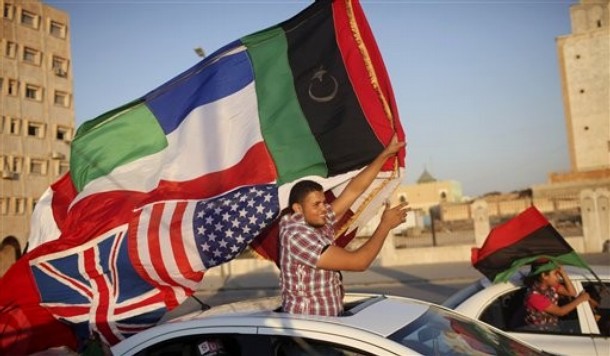
From Jason Pack & Karim Mezran, New Atlanticist: From Cairo on the Nile to Tunis on the Mediterranean, a political vacuum has descended across North Africa. The Arab Spring ushered in new freedoms, but it also weakened existing state structures and unleashed a cultural and political free-for-all, favorable to mobilization, assassinations and propagation of extremist ideology. The region’s newly elected governments are rapidly failing to produce results, put aside internecine bickering or form grand coalitions. Despite their democratic legitimacy, they are losing the consent of their populations. Amid this chaos, North Africa’s Saharan underbelly, the Sahel, is on the verge of replacing the Afghanistan/Pakistan border as the major global safe haven for terrorist networks. Libya is both at the root of these problems and the key to the solution.
The spread of Salafist and jihadist groups, the war in Mali and the recent terrorist attack in Algeria are all direct consequences of the overthrow of Muammar Qadhafi. Paradoxically, international action in support of the Libyan people led to this whole mess, yet it is also the key to resolving it.
At present, Libya’s new central government is so weak that swaths of the country are ungoverned space — local authorities mediate disputes and the revolutionary militias dominate what few security institutions exist. Radicalized jihadists come and go as they please and heavy artillery from Qadhafi’s stockpiles is sold to the highest bidder. . . .
To help [Prime Minister Ali] Zidan bring stability, win back the trust of his people and cement his legitimate authority against [president of Libya’s parliament Mohamed] Magarief’s overreach, a new international coalition must help the Libyan government construct a coherent security apparatus. On Tuesday, representatives of the major Arab and Western powers — including the U.S. — met in Paris under the aegis of the Support Libya conference and finally agreed to “the rapid deployment of European experts” to train and rebuild Libyan security forces. To be effective, the whole process must be initiated, owned and managed by the Libyans, while building upon the international community’s role as guarantors of the Libyan revolution. . . .
Since multilateral engagement won the war, it is now time to reconstitute the coalition to win the peace. Tuesday’s decision could be the turning point. Success is achievable only if the right type of training is paired with high-level political engagement and if America invests significant diplomatic and technical resources.
The coalition should start by training a new security force, approximately 6,000 strong. NATO countries should lead, but key Arab allies should also be given a prominent role. This force should receive on-the-job training while securing the country’s borders and physical institutions. American know-how is needed to build an army capable of handling diverse threats from nonstate actors, leaving the Europeans to focus on training the police. . . .
Even the speedy French-led dispersal of Islamist forces in Mali cannot provide long-term gains if Libya remains an ungoverned space. Unrest in neighboring Tunisia — long thought of as the success story of the Arab Spring — threatens to undermine the very model of transition from dictatorship to constitutional democracy in line with Islamic cultural norms. Libya has the wealth, educated populace and strategic location to succeed. It is up to the Libyans and their allies to close ranks. Libya is truly the linchpin to any comprehensive strategy to bring stability to North Africa and the Sahel.
Jason Pack is president of Libya-Analysis.com and editor of “The 2011 Libyan Uprisings and the Struggle for the Post-Qadhafi Future.” Karim Mezran is a senior fellow with the Atlantic Council’s Rafik Hariri Center for the Middle East and a professor at SAIS-Johns Hopkins. This column was originally published by POLITICO. (photo: AP)
Image: ap%208%2024%2011%20Libya%20flags.jpg
